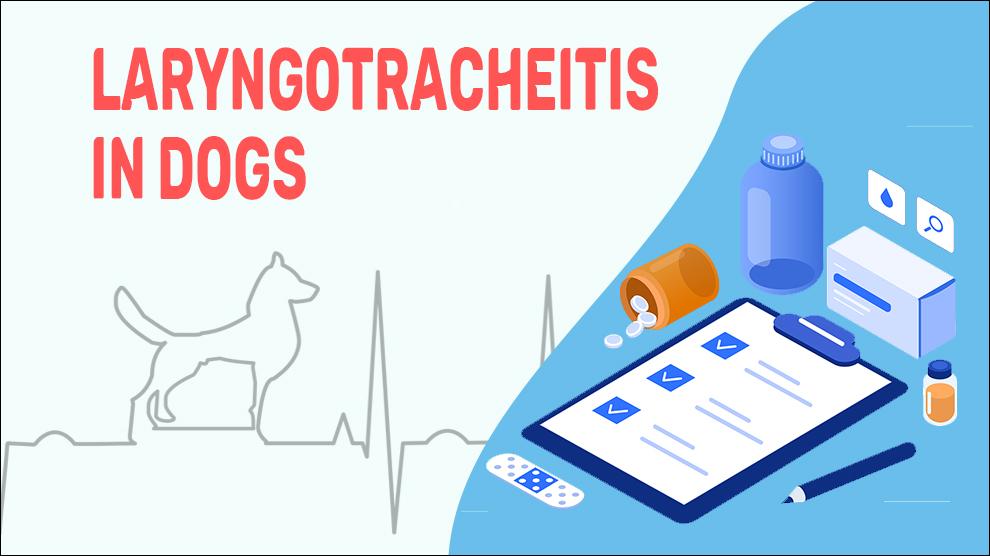What Is Laryngotracheitis In Dogs?
Infectious laryngotracheitis (ILT) is a rare, acute, and highly contagious cause of Canine Adenovirus type 2 (CAV-2) infection in dogs.
There is another laryngotracheitis infection (in poultry) which is also a highly contagious upper respiratory tract disease caused by Gallid herpesvirus 1. This should not be confused with canine laryngotracheitis (caused by CAV-2), which is similar to kennel cough and no clear-cut distinction is obtained yet.
The difference between canine adenoviruses 1 and 2 is that canine adenovirus 1 causes several systemic diseases, whereas canine adenovirus 2 infection results only in restricted respiratory disease.
CAV-2 virus infections are often confused with other viral infections including canine hepatitis and parvovirus because of the similarity in clinical signs and the organ systems affected. CAV-1 is related antigenically to CAV-2 (they are notorious for kennel cough infection). So these are often mentioned broadly as the ‘Canine Infectious Respiratory Disease Complex (CIRDC)’.
Similar to the Croup infection in children, laryngotracheitis is a mild, self-limiting disease that normally improves on its own. However, sometimes it can progress to chronic bronchitis in weakened, debilitated, or aged dogs and fatal bronchopneumonia in puppies. The disease spreads rapidly among susceptible dogs housed in close confinement, such as grooming facilities, rescue centers, kennels, or veterinary hospitals.
Symptoms Of Laryngotracheitis In Dogs
- Acute onset of a nonproductive cough
- Loud barking cough
- Rapid/labored breathing
- Fever
- Oculonasal discharge
- Loss of appetite
- Dehydration
- Wheezing
Severe cases
- Bronchopneumonia
- Tachypnea
- Respiratory distress
- Pyrexia
Treatment Options For Laryngotracheitis In Dogs
There is no specific treatment available for canine Laryngotracheitis
- There is no specific treatment for infectious Laryngotracheitis and most of the cases resolve without treatment (like the croup infection in children)
- Intravenous fluid and nutritional therapy may be given to help your dog if it becomes severely dehydrated.
- Your vet keeps your dog hydrated and only treat the symptoms while the virus runs its course.
- immunosuppressive or anti-inflammatory medications
- Broad-spectrum antibiotic for any secondary bacterial infections from occurring
- cough suppressants (Balminil, Benylin, Delsym, Robitussin)
Home Remedies For Laryngotracheitis In Dogs
Keep the affected dog in isolation and after they are deemed recovered for at least two more months.
Make sure that your dog gets appropriate vaccinations.
Limit the exposure of puppies to other dogs that may be infected or carrying the virus until they have completed their puppy vaccination series.
It is advisable to keep your dog’s bedding clean and sterile.
Prevention Of Laryngotracheitis In Dogs
Bordetella vaccine to prevent Laryngotracheitis
- First vax (6-8 weeks)
- Second vaccination (10-12 weeks)
- Intranasal and oral kennel cough shots – every 1 year
- The booster shots are effective for one year
Affected Dog Breeds Of Laryngotracheitis
There is no breed disposition
Boxers and other small breeds of dogs are most documented.
Additional Facts For Laryngotracheitis In Dogs
Transmission: Nasal discharge, saliva, feces, urine, and blood of infected dogs.
Morbidity:
- Laryngotracheitis symptoms start off with symptoms similar to Canine influenza virus, canine distemper virus infection, and Kennel cough.
- Multiple bacterial and viral pathogens are responsible for the disease Canine infectious respiratory disease complex (CIRDC) with similar symptoms and overlapping co-infections.
- The diagnosis is often based on physical examination findings and history of exposure; however, results can be difficult to interpret because of a multitude of subclinical infections, and identification of the etiologic agent needs the application of specific diagnostic tests.
Diagnosis:
- Rapid immunochromatographic strip assay and immunohistochemistry
- Enzyme-linked immunosorbent assay (ELISA)
- Indirect immunofluorescence assay
Mortality:
CAV-2 can be, sometimes life-threatening to vulnerable and immunocompromised dogs.
Vaccine:
Considering the risk factors facing your pet, check with your vet how often your dog should get shots.
Prognosis:
In most cases, Laryngotracheitis has a good prognosis as it is usually a mild disease.
The dog will recover without treatment in 3 weeks and it is typically able to continue with daily activities. Sometimes, the disease can linger for up to 6 weeks and run its course.
When To See A Vet For Laryngotracheitis In Dogs?
Contact your vet right away, if you notice any of the following:
- Loud barking cough not subsiding and continues for days
- Pneumonic symptoms in dogs
Food Suggestions For Laryngotracheitis In Dogs
- Establish a plan for dietary change
- Plan your menus for the pup
- Know your odds; think about what foods you must avoid
- Check with your vet, for any therapeutic or elimination diet
- It is significant to keep the dogs hydrated with lots of water
Foods to avoid:
- salt-heavy diet
- Avoid dairy products
- No to fried, ultra-processed, Hard, or jagged foods (such as Crunchy crackers, chips, etc)
- Hard to digest grains and greasy foods
- Be thoughtful about treats or tossing the leftovers
Conclusion
While the best prevention is to avoid high risk locations or contact with an infected animal that is not always possible.
When potential exposure cannot be avoided, proper vaccination can prevent or reduce the symptoms, decrease the duration of the illness and prevent the spread.
Regular health checks are recommended to ensure there are no secondary infections.
Even after recovery, your dog may not be in good health for a while, be aware that it takes time to fully recover and give them enough space until your dog is back to full health.

















